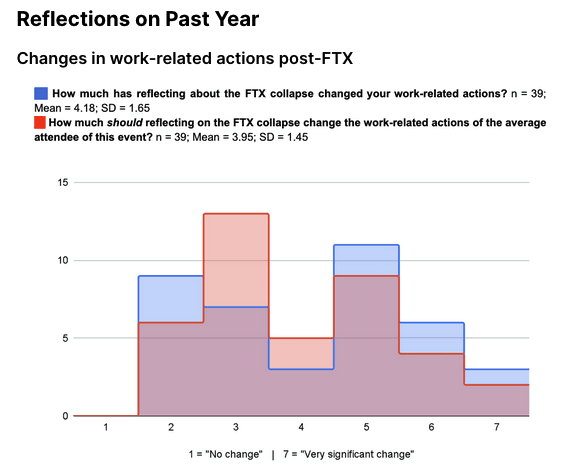A brief and belated update: When I resigned from the board of EV US last year, I was planning on writing about that decision. But I ultimately decided against doing that for a variety of reasons, including that it was very costly to me, and I believed it wouldn’t make a difference. However, I want to make it clear that I resigned last year due to significant disagreements with the board of EV and EA leadership, particularly concerning their actions leading up to and after the FTX crisis.
While I certainly support the boards’ decision to pay back the FTX estate, spin out the projects as separate organizations, and essentially disband EV, I continue to be worried that the EA community is not on track to learn the relevant lessons from its relationship with FTX. Two things that I think would help (though I am not planning to work on either myself):
- EA needs an investigation, done externally and shared publicly, on mistakes made in the EA community’s relationship with FTX.[1] I believe there were extensive and significant mistakes made which have not been addressed. (In particular, some EA leaders had warning signs about SBF that they ignored, and instead promoted him as a good person, tied the EA community to FTX, and then were uninterested in reforms or investigations after the fraud was revealed). These mistakes make me very concerned about the amount of harm EA might do in the future.
- EA also needs significantly more clarity on who, if anyone, “leads” EA and what they are responsible for. I agree with many of Will MacAskill’s points here and think confusion on this issue has indirectly resulted in a lot of harm.
CEA is a logical place to house both of these projects, though I also think leaders of other EA-affiliated orgs, attendees of the Meta Coordination Forum, and some people at Open Philanthropy would also be well-suited to do this work. I continue to be available to discuss my thoughts on why I left the board, or on EA’s response to FTX, individually as needed.
- ^
Although EV conducted a narrow investigation, the scope was far more limited than what I’m describing here, primarily pertaining to EV’s legal exposure, and most results were not shared publicly.


I'd note that Nick Beckstead was in active litigation with the Alameda bankruptcy estate until that was dismissed last month (Docket No. 93). I think it would be very reasonable for anyone who worked at FTXFF to be concerned about their personal legal exposure here. (I am not opining as to whether exposure exists, only that I would find it extremely hard to fault anyone who worked at FTXFF for believing that they were at risk. After all, Nick already got sued!)
It's harder to assess exposure for other groups of people. To your question, there may be a difference between mere silence in the face of knowledge/suspicion and somewhat supportive statements/actions in the face of the same knowledge. As a reference point, there was that suit against Tom Brady et al. (haven't seen a recent status update). Obviously, the promotional activity is more explicit there than anything I expect an EA-associated person did. However, the theory against Brady et al. may rely more on generic failure to investigate, while one could perhaps dig for a stronger case against certain EA-related persons on actual knowledge of suspicious facts. I can only encourage people with concerns to consult their own personal legal counsel.
But at the general community level, I would be hesitant to fault various other individuals for being concerned about potential personal legal exposure. Remember, the pain of legal involvement isn't limited to actual liability. Merely getting sued is itself painful; discovery is even more painful. Public statements could give someone motivation to try and/or ammo to get past a motion to dismiss for failure to state a viable claim.